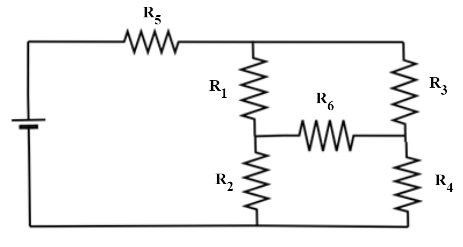Question
Question: For a given circuit it is observed that the current \(I\) is independent of the value of the resista...
For a given circuit it is observed that the current I is independent of the value of the resistance R6 . The resistance values must satisfy:

A. R2R3=R1R4
B. R3R4R6=R2R1R5
C. R3+R41=R5+R61=R1+R21
D. R3R1=R2R4=R5R6
Solution
To find the condition that satisfy the circuit in which the current I is independent of the value of the resistance R6 , i.e. no current should be flowing through R6 , we analyze the junctions of the same potential. We use the concept of Wheatstone’s meter bridge to find the condition.
Complete step by step answer:
We know that, current I is independent of the value of the resistance R6 , no current is flowing through the R6. This requires that the junction of R1&R2 must be at the same potential as the junction of R3&R4. This must satisfy the Wheatstone’s meter bridge balancing condition i.e. R2R3=R1R4.
Hence, option A is correct.
Note: The Wheatstone’s meter bridge is an arrangement of four resistances used to measure one of them in terms of the three. We should note that, on changing the position of the cell and resistances, the balancing condition is not changed. Resistance R5 is in series with R1, so it will not produce any effect in the balancing condition.
